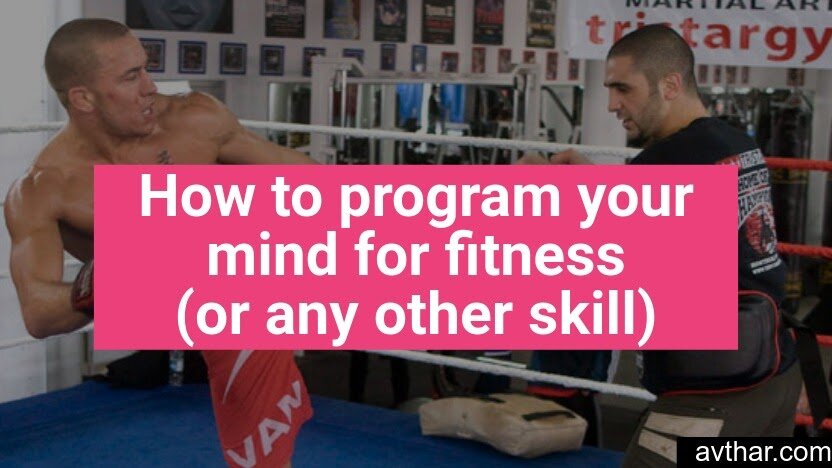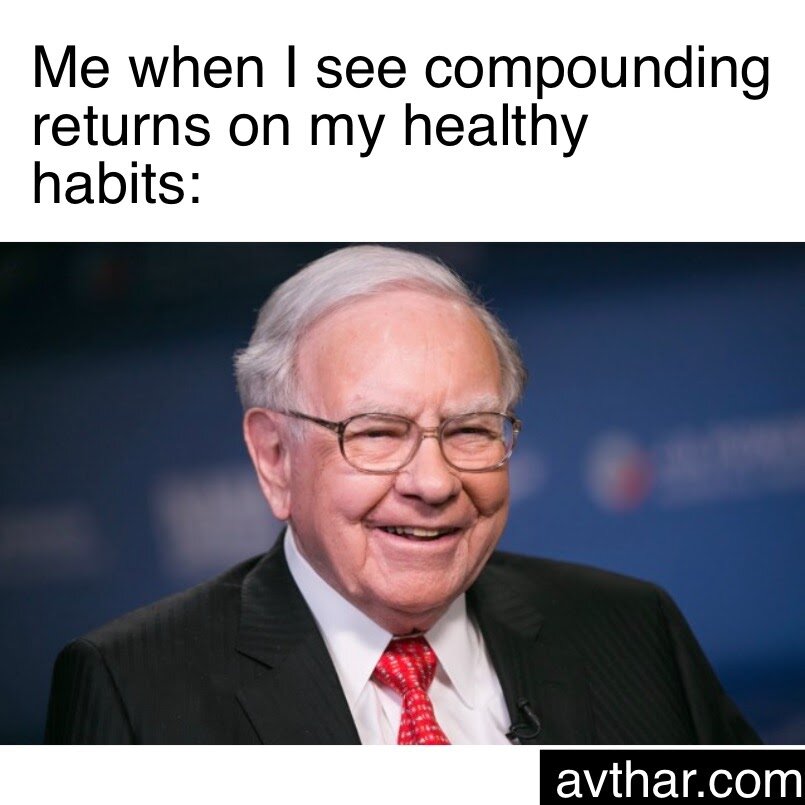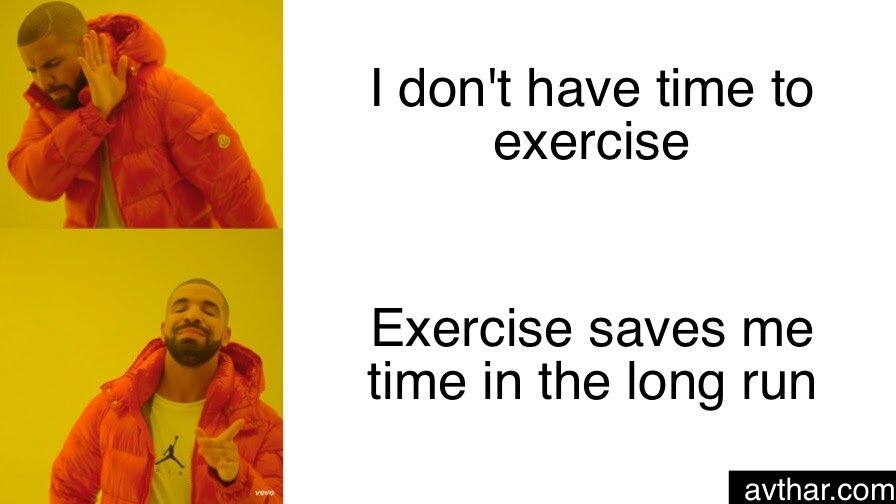How to Program Your Mind for Fitness (or any other skill)
The ideas I’m about to introduce to you are contrary to the commonly spouted ‘wisdom’ about how to become healthy.
Advice like “Be disciplined, work hard, put in the effort and you’ll achieve your goals” is commonly preached not only in health and fitness but for just about any other skill you want to improve at. This advice is well-intentioned but ultimately ineffective.
If getting unhealthy is effortless, can getting healthy be effortless as well?
I want to share principles for programming your mind for health and fitness. These principles are useful to help you build lasting habits in any area or skill, be it writing, working out, cooking, studying, reading etc. But for the sake of simplicity, I’ll use the example of building the skill of being healthy and fit in this essay.
6 Pillars to Program Your Mind for Fitness
Recognize that if getting unhealthy is effortless. So is getting healthy.
Start small. Build momentum. And never let go.
Make being healthy an effortless habit, like brushing your teeth.
Be wary of too much intensity, focus on consistency instead
Make time for health or make time for sickness, your choice.
Reframe your attitude to overcome your excuses
I was introduced to these pillars by Firas Zahabi (Twitter, IG). Firas is a renowned mixed martial arts trainer and coach to UFC Champion Georges St-Pierre (both pictured below). Oh, and he also holds a degree in philosophy. Long time readers may remember Firas from my short essay on Fasting and Philosophy from edition 4 of this newsletter.
1. Getting unhealthy is effortless. So is getting healthy.
In order to find a sustainable solution to a problem, we must first understand the nature of the problem itself.
How do we become unhealthy? By overeating unhealthy foods, not exercising frequently and living an unhealthy lifestyle of sleeping poorly and being stressed out all the time.
Becoming unhealthy is a by-product of an unhealthy lifestyle.
As Firas says: “You didn't go in the restaurant and say to yourself, ‘Hey, I'm going to push myself really hard. And I'm going to eat as much as I can. And I'm going to do this day in and day out, no matter how tough it is, until I get fat’...It just happens as a result of bad eating choices.”
Therefore if becoming unhealthy happened as a by-product of an unhealthy lifestyle, then then we should aim to construct a healthy lifestyle and habits, so that getting fit, losing weight and being more energetic is a by-product of our lifestyle.
Here are some examples of how you make health a by-product of your lifestyle:
Working out daily, even for 10 minutes
Daily intermittent fasting. What’s more effortless than not eating food?
Only buying healthy foods to that there’s no junk food to binge on
Defaulting to cooking over eating out
Get in the sun and get moving
2. Being fit is like brushing your teeth
The gold standard for habits is brushing your teeth.
As Firas says, “When you wake up in the morning and you brush your teeth, you don't struggle with whether you should brush your teeth or not. You've brushed your teeth enough times...that you brush your teeth automatically. I don't care if you're sick or you're hot or you're tired, you will always brush your teeth. Why? It takes little to no mental energy. You've been doing it since you're a kid. It's a habit.”
Our aim should be to make health and fitness like brushing our teeth: an effortless habit, something that requires little to no mental energy and something that we do daily.
Looking closer that what makes brushing your teeth so effortless can give us insight into how we can make health and fitness (as well as other habits) effortless as well:
We do it every day
We do it at the same time (in the morning and in the evening)
We do it in the same place
We have triggers (situational cues) that come before and after brushing our teeth (e.g. waking up or going to sleep)
Therefore, we can those same principles to making health and fitness an effortless habit:
Do it daily
Do it at the same time
Do it in the same place (or group of places)
Place being healthy and fit between activities that we always do, so that they become triggers
3. Be wary of too much intensity, focus on consistency instead
A surefire formula for not building effortless habits is to try to do too much too quickly. I’ve fallen into this trap before: trying to workout with too much intensity early on and ending up injured, as well as going on too extreme of a diet and falling back after a few days.
Too much intensity, especially early on in your health and fitness practice, will stop it from becoming a habit.
The secret to building a habit that lasts is to focus on consistency, not intensity.
Firas elaborates how prioritizing consistency helps you maintain a habit: “ I never pushed myself so far that I woke up the next day feeling like a wreck. I train every single day five to seven days a week. And I never wake up in the morning feeling hurt or busted up. Never. Because I know the next day I am going to work out again.”
By focusing on consistency, we make being healthy automatic. For example, if we do yoga for 10 mins a day, it becomes a part of our daily routine and becomes a lifetime habit.
The key is to not break your habit, because once you miss one day, it’s very easy to fall completely off the bandwagon. If you do miss a period of time, ensure to start again slowly so that you can remain consistent. This is why maintaining a streak of consecutive days or weeks is vital to reprogram for any habit without spending any mental energy to decide to practice that habit.
4. Start small. Build momentum. And never let go.
“Forget your fancy training programs, forget all these crazy protocols. focus on building momentum.” - Firas Zahabi
Momentum is your secret weapon to reprogram your mind and make being healthy effortless. Start with the smallest thing you can think of. Get momentum and then never let go.
For example, Firas recommends just starting with 1 single push up every day: “Start with just one pushup… a day. Now you're going to tell me ‘Hey, coach, one pushup a day doesn't burn fat. It doesn't shred you up. It doesn't build muscle.’ Remember I am not trying to build muscle I am not trying to shred fat. I'm trying to build momentum.”
After you’ve built some momentum, day doing 1 push up a day for 7 days, you realise that doing 1 pushup is easy, so you will naturally progress to doing 2 pushups a day, and then 3 and 4. Eventually momentum will push you to want to do 50 pushups and adding on other exercises like squats, running, yoga etc.
Starting small and being consistent will guarantee you building momentum which will lead to you doing more in the long run. Contrast this to starting off by trying to do 50 push ups a day, doing it for one day and then giving up. This also applies to other habits like writing where you can aim to write 100 words per day and then progress to writing 200, 300 and then eventually to 10 pages over the course of many months.
By focusing on practicing healthy habits consistently and slowly increasing over time, we benefit from compounding returns over the rest of our life.
5. Make time for health or make time for sickness. Your choice.
Many people say, “I know I should workout, but I don’t have time. I have kids, I have a stressful job, I have all these responsibilities.”
Firas has a brilliant reply to that:
“Make time for fitness or make time for getting sick. Make time for disease, make time for getting old. Because all that stuff's gonna happen if you do not train.”
Make time for health or make time for sickness, your choice.
Disease and it’s associated financial and physical costs will cost you a lot more than the time it takes to workout and eat healthy daily.
6. Reframe your attitude to overcome your excuses.
You don't always have control of your circumstances, but do you have control your attitude.
We all have false beliefs that hold us back from being healthy and fit (or building whatever habit we’re putting off). Things like “I don’t have enough time”, “I don’t have energy to train” etc.
Reframing your attitude to false beliefs will reprogram your mind to see to true benefits of health and fitness. Let’s look at how we can reframe the two excuses above, “I don’t have time” and “I don’t have energy to workout”.
False Belief #1: I don’t have time to exercise
Reframe: Exercising saves me time, from sickness, illness and old age
Firas elaborates, “I don't see fitness as costing me time. I see training as saving me time.
Training equals good health. Good health equals no need to go wait at the doctor's office equals. No need to get sick... Exercise will save you time. Think about it. It's a long term project. You want to be healthy for life. It'll save you time.”
False Belief #2: I don’t have the energy to train
Reframe: Training gives me energy
Firas elaborates, “Training gives you energy...training has a tonic effect. Exercise has a much more powerful tonic effect than any stimulant you can take out on the market today. [When you say you don’t have to exercise].. to me, you sound like a fool. It's like saying you're too dumb to learn. It's like saying you're too hungry to eat, or you're too tired to sleep. It makes no sense. I don't have the energy to give myself energy”
These are but two examples of how thinking about the long term benefits of health and fitness and other habits can help reframe your perspective on common excuses you use to avoid practicing those habits.
Summary
In summary, here’s how to program your mind for fitness:
1. Recognize that if getting unhealthy is effortless. So is getting healthy.
2. Start small. Build momentum. And never let go.
3. Make being healthy an effortless habit, like brushing your teeth.
4. Be wary of too much intensity, focus on consistency instead
5. Make time for health or make time for sickness, your choice.
6. Reframe your attitude to overcome your excuses
If you’d like to watch the videos these principles came from you can do so on Firas’s Youtube channel here and here.



